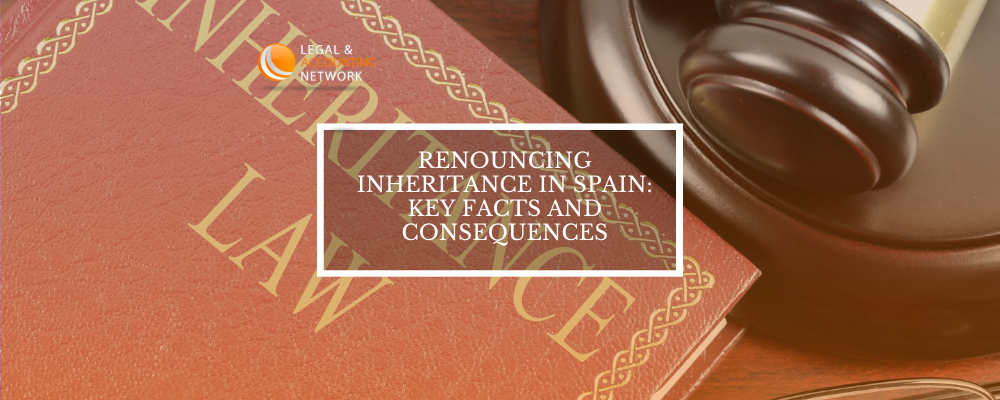Renouncing inheritance is a legal process that allows individuals to voluntarily give up their right to an inheritance. Depending on the laws and the deceased’s will, the assets may be distributed among other heirs or the renouncer’s children. In Spain, renouncing inheritance can be done before a Notary Public. It is crucial to seek legal advice as renunciation can have consequences for both the renouncer and potential coheirs.
Understanding Renouncing Inheritance
Renouncing inheritance is a complex legal process that involves voluntarily relinquishing one’s rights to an inherited estate. It is crucial to have a clear understanding of the different types of renunciation and the legal implications and consequences involved. This section provides an overview of renouncing inheritance, highlighting the various aspects relevant in Spain.
Types of Renunciation
When considering renouncing an inheritance, it is important to be aware of the two main types of renunciation: total and voluntary renunciation, and renunciation with exceptions.
Total and Voluntary Renunciation
Under total and voluntary renunciation, an individual fully declines the inheritance, both assets and liabilities. This renunciation is irrevocable and should be made after careful consideration and legal advice.
Renunciation with Exceptions
Renunciation with exceptions allows individuals to accept the inheritance but exclude the “benefit of inventory.” This means that if the debts of the estate exceed the assets, the renouncer will not be held liable for the outstanding debt amount.
Legal Implications and Consequences
Renouncing an inheritance has wide-ranging legal implications and consequences that should be thoroughly understood before making a decision.
Distribution of Assets
Depending on the laws and the deceased’s will, renouncing an inheritance may result in the assets being distributed among other heirs or the renouncer’s children.
Impact on Coheirs
Renouncing an inheritance can also impact other potential coheirs, as the renouncer’s share may be redistributed among the remaining beneficiaries.
Financial and Tax Considerations
Before renouncing an inheritance, it is essential to consider the financial and tax implications. Seek advice from financial and legal professionals to understand the potential consequences.
Renouncing Inheritance in Spain
In Spain, the process of renouncing inheritance follows specific guidelines and legal procedures.
Notary Proceedings
Renunciation in Spain can be done before a Notary Public, who will oversee the process and ensure compliance with legal requirements.
Documentation Requirements
To renounce an inheritance in Spain, certain documents are typically required, including the renouncer’s ID, the declaration of intestate heirs or testament, death certificate, and a certificate of last wills.
Potential Effects on Coheirs
It is important to note that renouncing an inheritance in Spain can have implications for other potential coheirs, potentially impacting their inheritance rights.
Increasing Renunciations in Spain
Renunciations of inheritance have been on the rise in Spain, particularly during times of economic crisis. Understanding the reasons behind this trend can provide valuable insights for those considering renunciation.
Time Limits for Renunciation
In Spain, renunciation must be done within 30 days from the time the heir becomes aware of the inheritance. It is essential to comply with this timeline to avoid potential complications.
Legal Assistance and Procedures
Seeking legal assistance from a lawyer or notary is highly recommended when renouncing inheritance in Spain. They can guide individuals through the specific procedures and ensure compliance with the relevant laws.
Seeking Legal Advice: Importance and Recommendations
When facing the decision to renounce an inheritance, it is crucial to seek professional legal advice. The intricacies of renouncing inheritance vary depending on the jurisdiction and individual circumstances, making it essential to have expert guidance throughout the process.
Consulting a lawyer or notary in Spain is highly recommended to ensure a clear understanding of the legal implications and potential consequences of renunciation. Their expertise will help navigate the complex laws and ensure compliance with all required procedures.
Legal advisors can provide invaluable assistance in assessing the distribution of assets, determining the impact on coheirs, and evaluating financial and tax considerations related to renouncing inheritance. They possess the knowledge and experience to guide individuals through the intricacies of these matters, ensuring their interests are protected.
Additionally, legal professionals can assist in gathering the necessary documentation for renunciation, including the heir’s DNI, the declaration of intestate heirs or testament, the certificate of death, and the certificate of last wills. They will ensure all required paperwork is complete and accurate, avoiding any potential complications or delays.
It is crucial to understand that renouncing an inheritance is a significant, irrevocable decision that can have far-reaching implications for both the renouncer and their potential heirs. Seeking legal advice provides individuals with a comprehensive understanding of their rights, obligations, and the potential consequences they may face.
By engaging a legal expert, individuals can make informed decisions based on their unique circumstances and objectives, taking into account any potential impact on their financial situation or the inheritance rights of other coheirs. Legal advisors will provide personalized guidance, allowing individuals to navigate the renunciation process confidently.
Given the increasing number of renunciations in Spain in recent years, seeking legal advice has become even more critical. Professionals in the field possess an up-to-date understanding of the evolving legal landscape and can offer insights into how economic and societal factors may impact renunciation proceedings.
To ensure a smooth renunciation process and avoid inadvertently accepting the inheritance, it is advisable to promptly seek legal advice. Taking immediate action allows individuals to avoid any behaviors that could be interpreted as implicit acceptance and ensures they can fully assess the consequences before making a final decision.
FAQ: Common Questions on Renouncing Inheritance
How do I renounce an inheritance in Spain?
To renounce an inheritance in Spain, you need to go through the Notary proceedings. It is recommended to seek legal advice before initiating the process to understand the implications fully. The Notary will guide you through the necessary steps and ensure that the renunciation is properly executed.
What documents are required for the renunciation?
When renouncing an inheritance, you will need to provide several documents, including your DNI (Spanish identification card), the act of declaration of intestate heirs or the will, the death certificate of the deceased, and the certificate of last wills. These documents are essential for the Notary to process your renunciation correctly.
Can I renounce only a part of the inheritance?
No, it is not possible to renounce a specific portion of the inheritance in Spain. The renunciation is a complete act, and you either accept or reject the entire inheritance. It is crucial to carefully consider the consequences before making a decision.
Can renouncing my inheritance affect other potential coheirs?
Yes, renouncing an inheritance in Spain can have an impact on other potential coheirs. When you renounce, the assets that would have been allocated to you are distributed among the remaining heirs according to the laws of inheritance. Therefore, it is essential to bear in mind that your decision may affect the share of the inheritance that others receive.
Is it possible to renounce an inheritance during the lifetime of the deceased?
No, renouncing an inheritance is only possible after the death of the individual. You cannot renounce or take any actions related to the inheritance while the person is still alive.
When should I renounce an inheritance in Spain?
It is advisable to renounce an inheritance in Spain as soon as possible. Delaying the renunciation may create the risk of unintended actions that could be interpreted as accepting the inheritance. To ensure a clear and unambiguous renunciation, it is advisable to initiate the process promptly.
What are the consequences of renouncing an inheritance?
Renouncing an inheritance is a personal, voluntary, and irrevocable act. By renouncing, you forfeit your right to the assets and relieve yourself of any associated debts or obligations. It is crucial to seek legal advice to understand the specific consequences in your situation, as they may vary depending on the circumstances and the applicable laws.
Are there any financial or tax considerations when renouncing an inheritance?
Renouncing an inheritance may have financial and tax implications. It is crucial to understand the potential consequences, such as any tax obligations associated with the assets that would have been inherited. Seeking advice from a financial or tax professional can help you assess and manage these considerations effectively.
Can I change my decision to renounce the inheritance after the process has started?
Once the renunciation process has been initiated and completed, it is generally not possible to reverse or change the decision. Renouncing an inheritance is an irrevocable act, so it is essential to carefully consider the implications before proceeding.
Do I need legal assistance for renouncing an inheritance in Spain?
While it is not mandatory, seeking legal assistance is highly recommended when renouncing an inheritance in Spain. A lawyer experienced in inheritance law can provide valuable guidance, ensure your rights are protected, and help you navigate the complex legal procedures involved.







